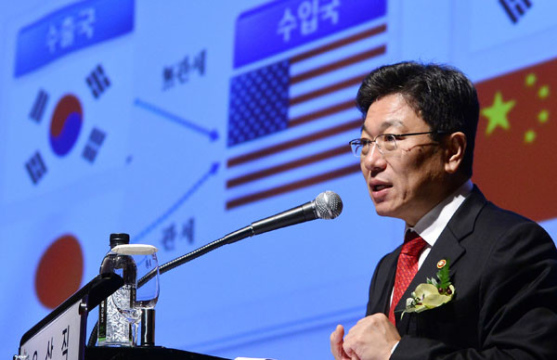
Mexican vs Chinese Factories
With the rising cost of wages in China, manufacturers are increasingly considering Mexico an attractive location to ‘re-shore’ production.
The Mexican Business Council last month told the government of President Andrés Manuel López Obrador that worker strikes at factories in the northern state of Tamaulipas and blockades of railways by a teachers’ union had cost more than $1 billion dollars in losses and could cause businesses to close. What are the reasons behind the workers’ strikes, and will there be more labor strife in the period ahead? How powerful are unions in Mexico’s manufacturing sector? Will proposed changes in the United States-Mexico-Canada Agreement alter the business-labor dynamics in the country?
Carlos H. Aceves del Olmo, PRI senator and secretary general of the Confederation of Mexican Workers (CTM) union: “The real reasons are political. The president decided to increase the minimum wage 100 percent in border states. Of course, as a worker representative, I will never oppose improvements to wages. However, the workers’ reactions should have been expected, and norms should have been established for such increases. In addition to this, there are new labor unions that are seeking to destabilize companies to gain ground on labor issues. Labor union autonomy exists; therefore, each labor organization is in charge of annual contractual reviews with companies. In the Confederation of Mexican Workers, or CTM, we work to ensure labor peace. It’s not our style to call for strikes, because we believe that through dialogue you can reach agreements that benefit workers. As a senator, CTM’s secretary general and president of ‘Congreso del Trabajo,’ I will be following the implementation of the new trade deal. It shouldn’t affect the dynamics. Through Mexico’s tripartism, we have been able to agree—among workers and businesses—on maintaining labor peace.”
Richard Sinkin, partner at InterAmerican Group in San Diego, Calif.: “It should come as no surprise to anyone involved in Mexican politics and business that there has been an increase in union organization and strikes. New President Andrés Manuel López Obrador comes out of a strong leftist, pro-labor wing of Mexican politics. He has made it clear both during the campaign and since taking office in December that he will back pro-labor activities to strengthen labor’s bargaining position in the political arena. One clear example is the administration’s acceptance in the revised NAFTA agreement that 40 percent of Mexican auto manufacturing has to be done with workers making at least $16 per hour, five times more than what is being paid per hour now but still significantly below auto industry wages in Canada and the United States. Unions’ bargaining position has historically been very weak because both the long-ruling PRI as well as the more conservative PAN have seen unions as essential vote delivery systems rather than true unions fighting for better pay and working conditions. The unions are particularly weak in the private sector, such as the maquiladoras that typically have ‘company’ unions (not national ones), and somewhat stronger in state-owned enterprises, such as Pemex, where the unions are notoriously corrupt. And for decades, official Mexican wage policy has held down the minimum wage, a multiple of which is used to calculate hourly wages in Mexican factories. AMLO hopes to rebalance the political power equation by strengthening unions. His pro-labor policies probably won’t work given how weak the unions are now.”
Brian Finnegan, global worker rights coordinator at the international department of the AFL-CIO, and Gladys Cisneros, country program director of Solidarity Center in Mexico: “The strikes in Matamoros illustrate the pent-up frustration over low wages, which have been historically and systematically suppressed as a matter of government policy and anti-democratic union practice in Mexico. Maquiladora workers in Matamoros undertook strikes to demand wage increases and a bonus enshrined in their collective bargaining agreements, related to new expectations with the new government’s shifting wage policy, and their victories inspired workers in other low-wage sectors to make similar demands. These are important events that demonstrate not only the deep dissatisfaction with their dramatically low wages, but also a clear need for workers to express collectively their accumulated frustration and demand real change on the ground. It shows what happens when workers are shut out of the decisions that govern their working conditions and their lives. Having recently ratified ILO convention #98 on collective bargaining and the right to organize, Mexico has signaled that it intends to take measures in law and in practice that enable Mexican workers to exercise the rights that would make mature industrial relations more common in Mexico. We’ll have to keep watching to see how real these changes become. That is the long-term sustainable solution to improving wages and conditions and reducing inequality in Mexico, as anywhere else.”
Carlos Ferrán Martínez, partner of the labor and employment practice at Cuesta Campos y Asociados and general coordinator of committees at Ilustre y Nacional Colegio de Abogados de México (INCAM): “There are plenty of reasons behind the strikes. Without a doubt, the most significant ones are related to the recent raise to the Mexican general minimum wage. There was an increase of around 16 percent in 2019, considering the independent recovery amount. The salary increase was of 100 percent in the northern border region. These conditions, as well as other macroeconomic factors—such as the cost of the ‘basic market basket,’ consumer goods and market inflation—will be considered and followed up on in a mandatory annual revision to collective bargaining agreements (CBA) throughout the region. Because of these increases and the newly instated Mexican administration (which is very employee-oriented), employees and unions feel empowered enough for the CBA revision to result in a considerable increase in benefits and salaries, which would be directly reflected in companies’ finances and stability. Mexican unions, as an institution, have massive and real political power, since they are entitled to organize strikes with no actual reason or basis. By doing so, they compromise the entire company’s functioning. This is expected to change with the most recent labor and employment reform. It is because of this that it is highly recommended not only to have a CBA—in order to be protected from extortionist threats—but also in order to activate the union’s life within the company and build a strong relationship with it, which results in the promotion of better working and employment conditions as well as stability and security for the company and foreign investment. As far as the USMCA goes, it encourages better working conditions in Mexico, including regulation that guarantees the basic human right of free association, which every employee is entitled to.”
 The Latin America Advisor features Q&A with leaders in politics, economics, and finance every business day. The publication is available to members of the Dialogue’s Corporate Program and others by subscription.
The Latin America Advisor features Q&A with leaders in politics, economics, and finance every business day. The publication is available to members of the Dialogue’s Corporate Program and others by subscription.
With the rising cost of wages in China, manufacturers are increasingly considering Mexico an attractive location to ‘re-shore’ production.
South Korea’s entry into the TPP will promote stronger cooperation between South Korea and Latin America.
Mexican civil society organizations and individuals are pressing for education reform, including reducing the Teachers’ Union.
